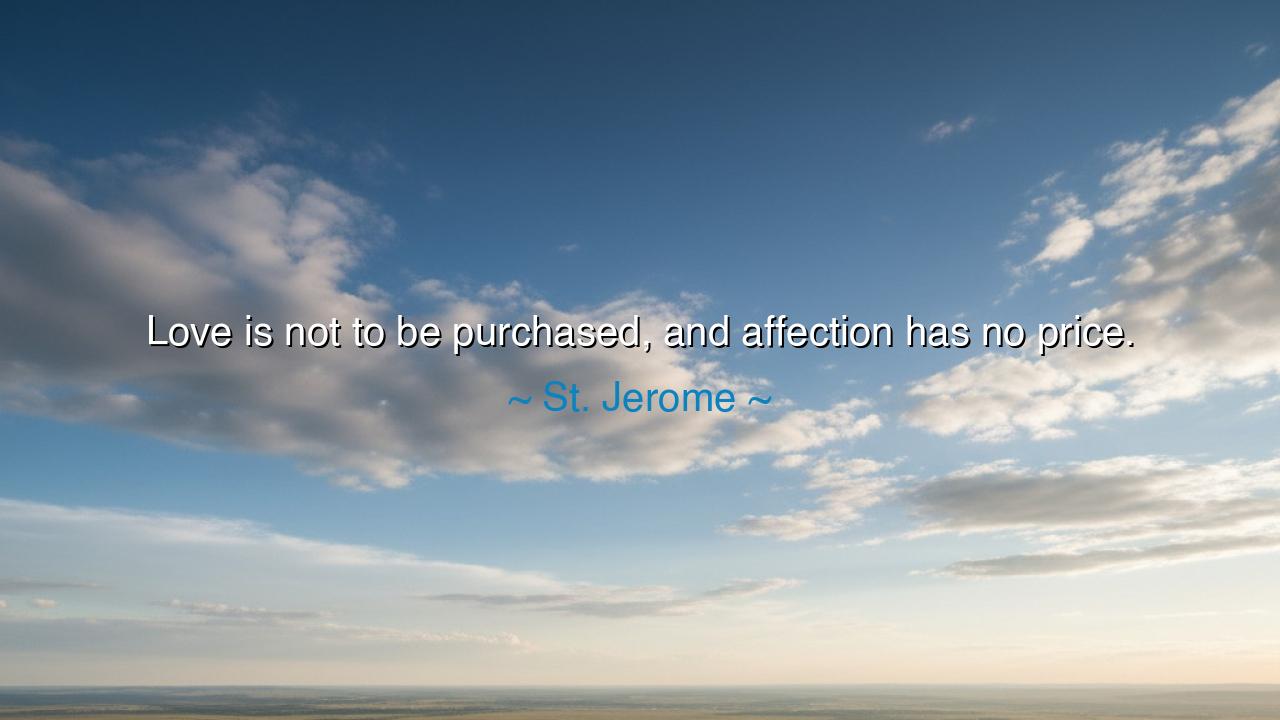
Love is not to be purchased, and affection has no price.






Hear the immortal words of St. Jerome, the scholar-saint and translator of the Holy Scriptures, who wrote: “Love is not to be purchased, and affection has no price.” In this simple yet eternal truth lies the unshakeable foundation of all human virtue. For love, the most sacred of gifts, cannot be bought, bartered, or earned through worldly means — it flows freely, born from the heart’s divine nature. Affection, too, cannot be traded like gold or silver, for it is not of the marketplace but of the spirit. Jerome’s words ring across the centuries as both warning and reminder: that those who seek love through possession or power will grasp only shadows, while those who give it freely will touch eternity.
St. Jerome, born in the fourth century, lived in a time when empires rose and fell, when the wealth of Rome dazzled and corrupted the hearts of many. Yet he withdrew from that glittering world, retreating into the deserts of Syria to find truth not in luxury, but in solitude and prayer. From his study came wisdom like this — wisdom that speaks not only to his age, but to every generation since. For he saw with piercing clarity that love is not a transaction, but a grace. He had witnessed how men sought favor, friendship, and even devotion through wealth or flattery, yet he knew such love was false — a counterfeit light that flickers out when the gold runs dry. Only love that is freely given, born of genuine heart and divine reflection, endures beyond time.
To say “Love is not to be purchased” is to declare that the soul itself cannot be bribed. Love, in its truest form, is freedom. It binds no one by chains, but joins all through choice. Those who would buy affection — with wealth, with promises, with power — seek not love, but control. True affection cannot be compelled; it must arise as naturally as the dawn. Even the poorest man, who owns nothing but his heart, can love more deeply than the richest king who believes he can command it. For the heart does not bow to coin; it listens only to sincerity.
History gives us countless examples of this truth. Consider the story of St. Francis of Assisi, who renounced his inheritance and wealth to live among the poor. His family and friends thought him mad, yet his love for creation and for God was so pure that even the lowliest and most broken souls followed him willingly. He had nothing — and yet he had everything. People were drawn to him not by what he possessed, but by what he radiated: unconditional affection, unmeasured by price. So powerful was this love that it outlived him, shaping hearts long after his body returned to dust. In St. Francis, as in St. Jerome’s words, we see the divine paradox — that love’s power grows in proportion to its purity, and purity is found only in selflessness.
Even in the secular world, this truth resounds. Think of Mahatma Gandhi, who won the hearts of millions not through wealth or force, but through compassion and moral strength. His love for his people, his steadfast belief in peace, became the mightiest weapon against oppression. Empires held gold and armies, yet he held something greater — affection unpurchased and incorruptible. Love such as his cannot be bought, for it is born from truth, not transaction. In him, as in the saints before him, we see that love, when stripped of selfishness, becomes divine.
St. Jerome’s teaching also warns us of the dangers that arise when we forget this law. The modern heart, seduced by the glitter of possessions, often mistakes attention for affection, and flattery for love. People seek to buy happiness — with gifts, with approval, with masks that please the world. But what is gained this way is hollow, a fragile reflection of the real thing. Love that is purchased dies quickly, for it was never alive; love that is given freely endures, because it springs from the eternal source within the soul.
So let this be your teaching, O child of time: Give love without counting, and receive it without demanding. Seek not to buy affection, nor to earn it by pretense. Instead, cultivate a heart that gives for the joy of giving. Be kind, not to gain favor, but because kindness is its own reward. When you love — truly, humbly, unconditionally — you become rich beyond measure. For such love draws others not by need, but by the invisible magnet of authenticity.
For truly, as St. Jerome wrote, “Love is not to be purchased, and affection has no price.” Let these words be carved into the walls of your heart. The wealth of kings fades; the beauty of youth passes; even fame is forgotten. But love that is free, love that asks for nothing — that is the one treasure that death cannot steal. Therefore, live not as a merchant of affection, but as a keeper of the sacred flame. Let your love be pure, your compassion generous, and your heart open — for only then will you taste the abundance that no coin can ever buy.






AAdministratorAdministrator
Welcome, honored guests. Please leave a comment, we will respond soon